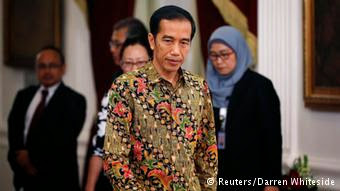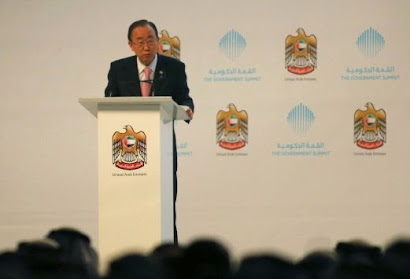 |
| Andrew Chan, right, and Myuran Sukumaran wait in their court holding cell in Denpasar in this 2010 file photo. The pair are set to be executed this month, officials say. (AFP Photo/Sonny Tumbelaka) |
Jakarta. A
new report by the International Narcotics Control Board, or INCB, has called on
all countries to abolish the death penalty for drug-related crimes.
In the
INCB’s annual report, which was published on Tuesday, board members encourage
all “states which retain and continue to impose the death penalty for
drug-related offenses to consider abolishing the death penalty.”
The INCB is
an independent United Nations supervisory body, tasked with monitoring member
states to ensure compliance with international drug treaties. Established in
1961, the INCB is made up of 13 elected representatives with expertise in
either medicine or pharmacology, who are chosen once every five years by the
UN’s Economic and Social Council.
The release
of the INCB’s latest report comes just days before the administration of
President Joko Widodo is scheduled to execute 10 drug traffickers on Nusakambangan
prison island. Among the convicts slated for execution are Australian citizens
Andrew Chan and Myuran Sukumaran, who arrived on the island under military
escort on Wednesday morning.
The INCB’s
report also coincides with the 58th annual meeting of the UN Commission on
Narcotic Drugs (CND), which is scheduled to take place in Vienna next week. The
commission is made up of 53 representatives from a cross section of member
states, and is tasked with considering new policy measures on international drug
control.
The issue
of capital punishment is expected to be highlighted at next week’s CND meeting,
following a highly publicized flurry of executions in Indonesia, many of which
involve foreign nationals such as Chan and Sukumaran.
Indonesia’s
policy of executing drug traffickers has provoked international condemnation
from both human rights campaigners and foreign governments who believe capital
punishment is an inhumane and ineffective way of combatting drug crime.
In January,
Joko’s decision to execute a Dutchman and a Brazilian national sparked a
diplomatic crisis in which the Netherlands and Brazil recalled their
ambassadors from Jakarta. Another Brazilian and one French national are now
among the 10 drug convicts scheduled for execution this month, with both
governments threatening diplomatic sanctions should the executions go ahead.
Tensions
between Indonesia and its close neighbor Australia are also set to escalate,
after numerous requests to spare the lives of Chan and Sukumaran were rejected by
Indonesia’s attorney general, H.M. Prasetyo. Australian Foreign Minister Julia
Bishop attempted an eleventh-hour prisoner swap to spare Chan and Sukumaran
from the firing squad, but this too, was flatly rejected.
A coalition
of 11 human-rights groups and drug-policy think-tanks have also weighed in on
Joko’s execution policy.
On Tuesday
morning, following the launch of the INCB’s report, the coalition released a
joint statement condemning the “recent spate of executions in Indonesia,” and
also citing a “widening rift” between UN member states on the issue of capital
punishment.
The joint
statement — which has been signed by
Reprieve, Harm Reduction International and the International Drug Policy
Consortium — notes that “[a] number of other countries [in addition to
Indonesia] have demonstrated a renewed enthusiasm for executing drug offenders
over the past year.”
Iran, for
instance, is believed to have executed more than 300 drug traffickers in 2014,
and is thought to have executed 50 such convicts in January 2015 alone. Harm
Reduction International believes that Iran has executed at least 10,000 drug
convicts since the revolution of 1979, which represents the world’s highest
per-capita execution rate on record.
Pakistan, a
country that has previously considered ending capital punishment for drug
offenses, has now returned to a policy of executing convicted drug traffickers.
In December
2014, the Pakistani government ended a six-year-moratorium on capital
punishment, and now has at least 500 prisoners slated for execution in the
coming months.
Among those
500, according to Tuesday’s joint statement, there are at least 112 drug
traffickers who were apprehended with support and funding from the United
Nations Office on Drugs and Crime (UNODC), an agency that officially opposes
capital punishment for all drug offenses.
Oman, one
of the few countries in the region that does not currently execute drug
offenders, is also taking steps to introduce capital punishment.
In June
2014, the Omani State Council backed a proposal that would make drug
trafficking a capital offense. The proposal is now being discussed at a “higher
level” of government, according to Tuesday’s joint statement, “before being
incorporated into [Omani] law.”
Amid this
backdrop of growing polarization on the issue of capital punishment, UN member
states will be keen to assert their position at the CND meeting slated for next
week.
The timing
of the INCB’s renewed call for all states to abolish capital punishment is
crucial, since it reminds member states that the use of such provisions to
combat drug crime runs counter to the will of the UN’s one and only independent
supervisory body on drug control.
Having made
its first statement condemning capital punishment only a year ago, the INCB is
a late addition to the growing chorus of UN agencies and national governments
calling for abolition.
After
enduring decades of criticism for its failure to take an official stance on the
death penalty, the INCB now stands shoulder-to-shoulder with a long list of UN
authorities — including the secretary general, the UN Human Rights Committee
and the UNODC — in its opposition to capital punishment.
Only time
will tell, however, whether the growing consensus on the need to abolish the
death penalty for drug offenses will translate into concrete policy changes at
the level of each member state.
Rick Lines,
executive director at Harm Reduction International, suggests the UN should cut
funding to those states that continue to execute drug traffickers, as a form of
leverage in the battle for abolition.
“The first
step must surely be for the UN to refuse to fund anti-drug operations in states
which maintain the death penalty for drug offenses,” Lines said in Tuesday’s
joint statement, “and instead use this money to tackle the health, social and
human rights impacts of drug use.”
The impact
of any such outside pressure remains in doubt, however, given that President
Joko’s mantra of “no compromise” has proved to be immensely popular among
conservative voters.
 |
United
Nations Secretary General Ban Ki-moon has pleaded to Indonesia to
stop the
execution of prisoners on death row for
drug crimes. AFP PHOTO
|
Related Article:






No comments:
Post a Comment